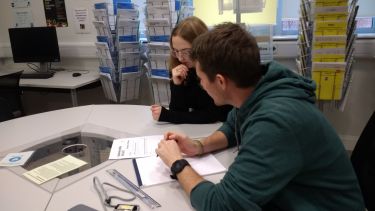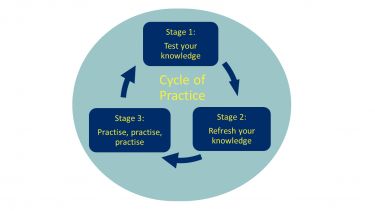Level up your skills
Resources to help you brush up your skills at the start of your course.
How to use this page
This page is designed for students beginning courses (although it may be useful to you at any time). If you feel a little rusty on your maths and stats skills, it's a great idea to put aside a little time and fill those gaps. Below are some resources to help you learn some common topics.
We've selected these topics specially to represent the topics which courses most frequently expect students to know. Different courses have different requirements so bear in mind what the entry requirements were for your subject.
We've also compiled some advice on how to study maths effectively.
If you'd like help or advice, get in touch or book a 1:1 appointment with us.
To help your essential academic and study skills, please visit our 301 Academic Skills pages for comprehensive support and resources.
Resources
- Topics from GCSE and equivalent qualifications
- Topics from Higher Tier GCSE/Introductory A-Level and equivalent qualifications
- Topics from A-Level and equivalent qualifications
More Topics
You can find resources on many other topics using our resources pages.
Maths ResourcesStats Resources
How to Study Maths and Stats
Getting good at maths and stats is a matter of practising skills, like learning an instrument or a sport. Many people focus on the first step: learning the methods, without moving on to the next step: consolidation through practice. If this sounds familiar, or if you’ve had other problems learning maths in the past, don’t panic! We’re here to help!
Effective methods for learning mathematics follow the Cycle of Practice
Stage 1: Test yourself
Can you solve questions at the required level? Don’t allow yourself to use notes or look things up. Make sure you actually do the questions, don’t just look at the answers and convince yourself you could have done the question.
If you got the questions right, have you practiced to the point where you won’t forget the topic? If so, great! It might be time to move on to a new topic.
If you got some questions wrong, that’s fine, now you know what you need to work on. Move on to stage 2.
Stage 2: Refresh your knowledge
Consider whether you once knew how to do the questions and you’ve forgotten, or whether this topic is new. Can you recall the key points in the method? If you need an explanation of how to do the topic, the resources linked above are designed to help you. It might help to write your own notes. If you’ve tried this and it hasn’t helped, consider booking a MASH 1:1 session.
Stage 3: Practice, practice, practice!
When learning maths, it's vital to practice by doing questions. This should take up most of your time when learning a topic. Again, the links above will help you find some useful exercises. You know you’ve done enough when you feel like you would be able to do the questions without help in a month’s time. Now it’s time to go back to Stage 1 and test yourself. Ideally, you would do this after a day or two, to be sure that you have understood the method.
Don't forget that if you would like some additional support, you can always book an appointment to speak with one of our friendly advisers. We're here to help all students on all courses at all levels of study.
Maths Anxiety
And last, but by no means least, if the thought of maths and stats makes you feel anxious, you are not alone! Many people have experienced anxiety around maths. Take a look at the resources our maths anxiety page (student login required) to learn about some strategies that might help.

Book a 1:1 appointment or workshop
Would you like to explore a maths or stats topic in greater depth? Why not book a 1:1 with an advisor or a workshop (current students only).

